2024届高三英语一轮复习主动表被动现象 & 被动形式表主动含义 课件-(共25张PPT)
文档属性
| 名称 | 2024届高三英语一轮复习主动表被动现象 & 被动形式表主动含义 课件-(共25张PPT) |  | |
| 格式 | pptx | ||
| 文件大小 | 23.3MB | ||
| 资源类型 | 教案 | ||
| 版本资源 | 通用版 | ||
| 科目 | 英语 | ||
| 更新时间 | 2023-11-17 21:39:03 | ||
图片预览

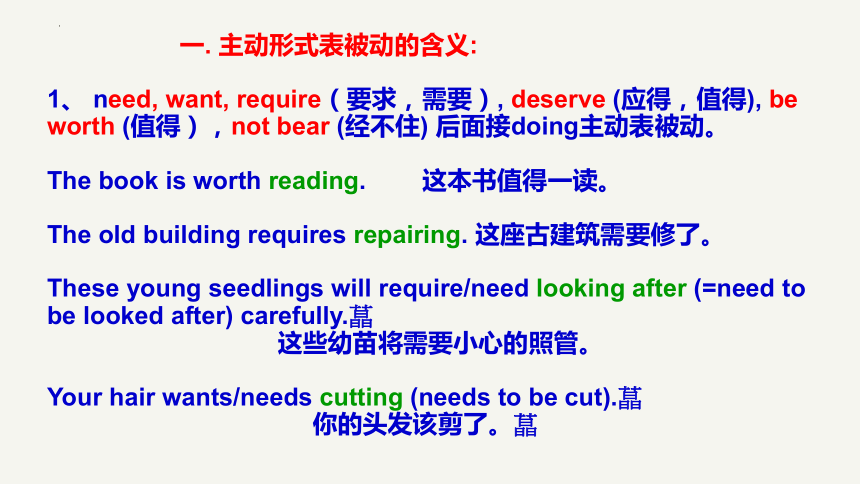
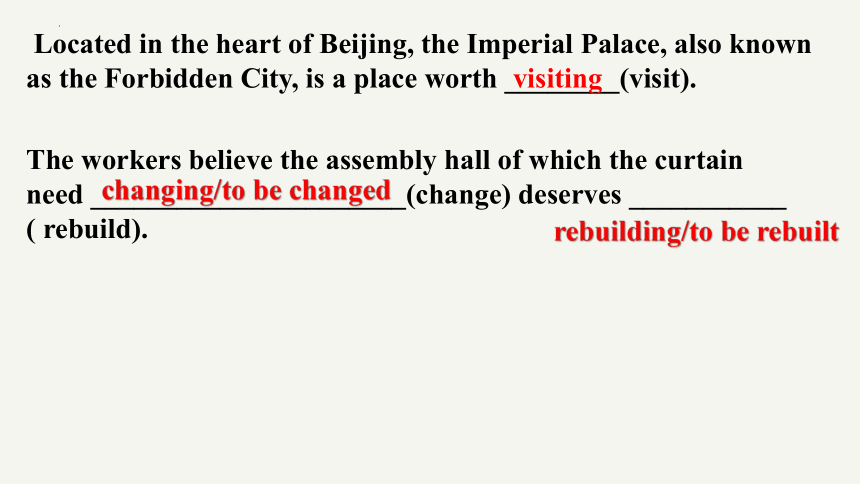
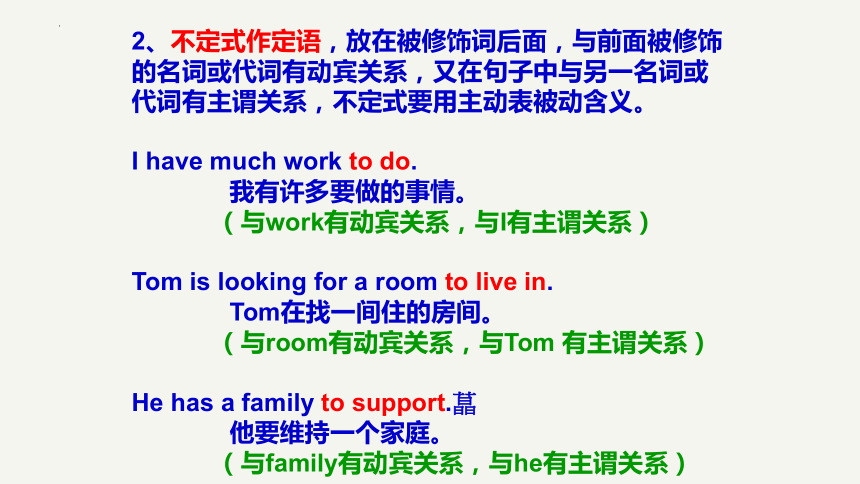
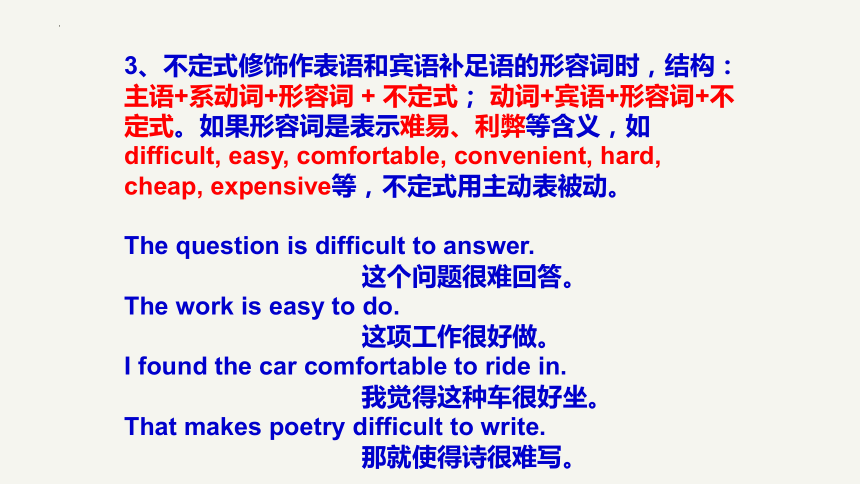
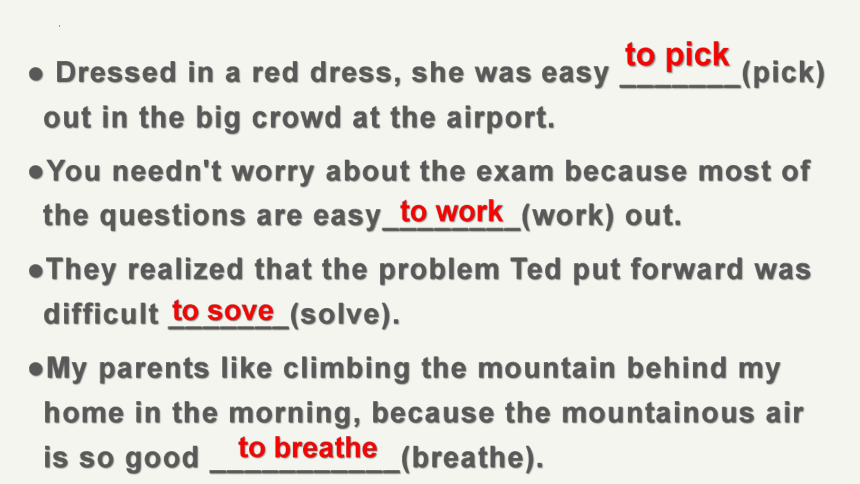
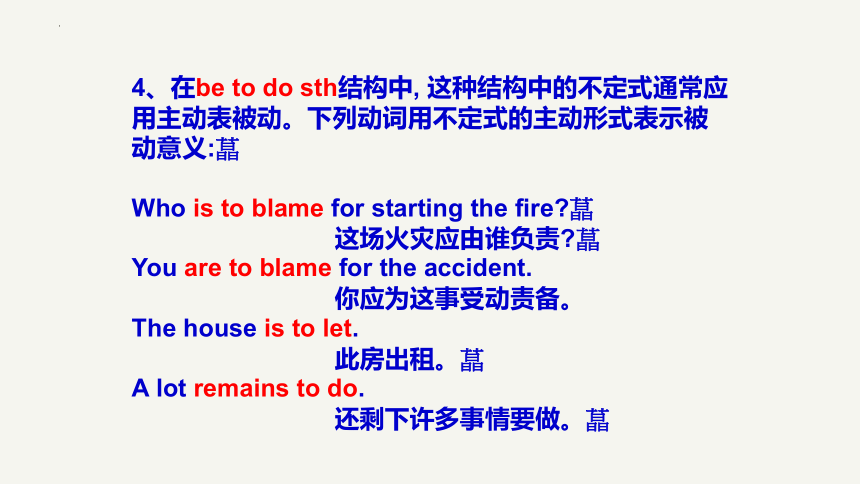
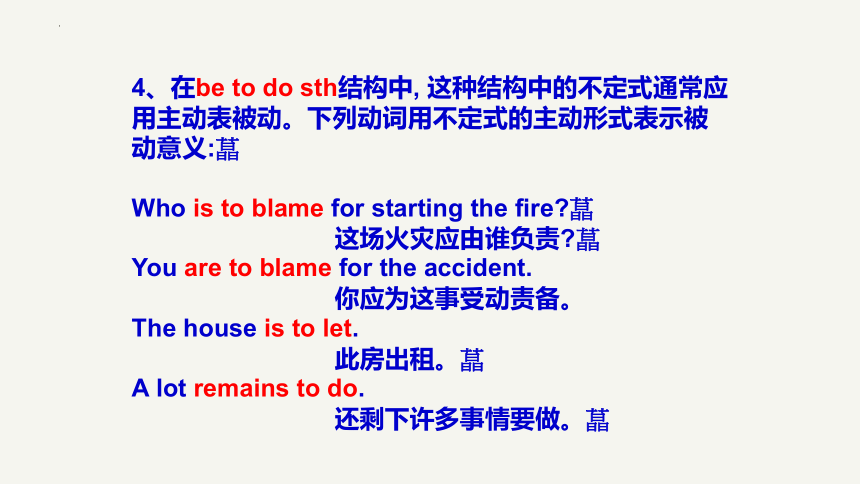
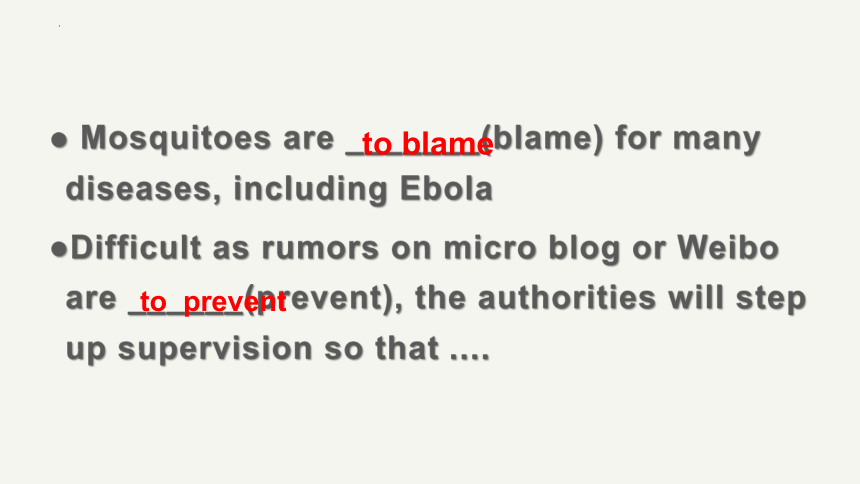
文档简介
(共25张PPT)
英语中
主动表被动现象& 被动形式表主动含义
一. 主动形式表被动的含义:
1、 need, want, require(要求,需要), deserve (应得,值得), be worth (值得),not bear (经不住) 后面接doing主动表被动。
The book is worth reading. 这本书值得一读。
The old building requires repairing. 这座古建筑需要修了。
These young seedlings will require/need looking after (=need to be looked after) carefully.?
这些幼苗将需要小心的照管。
Your hair wants/needs cutting (needs to be cut).?
你的头发该剪了。?
Located in the heart of Beijing, the Imperial Palace, also known as the Forbidden City, is a place worth ________(visit).
visiting
The workers believe the assembly hall of which the curtain need ______________________(change) deserves ___________ ( rebuild).
rebuilding/to be rebuilt
changing/to be changed
2、不定式作定语,放在被修饰词后面,与前面被修饰的名词或代词有动宾关系,又在句子中与另一名词或代词有主谓关系,不定式要用主动表被动含义。
I have much work to do.
我有许多要做的事情。
(与work有动宾关系,与I有主谓关系)
Tom is looking for a room to live in.
Tom在找一间住的房间。
(与room有动宾关系,与Tom 有主谓关系)
He has a family to support.?
他要维持一个家庭。
(与family有动宾关系,与he有主谓关系)
3、不定式修饰作表语和宾语补足语的形容词时,结构:主语+系动词+形容词 + 不定式; 动词+宾语+形容词+不定式。如果形容词是表示难易、利弊等含义,如
difficult, easy, comfortable, convenient, hard, cheap, expensive等,不定式用主动表被动。
The question is difficult to answer.
这个问题很难回答。
The work is easy to do.
这项工作很好做。
I found the car comfortable to ride in.
我觉得这种车很好坐。
That makes poetry difficult to write.
那就使得诗很难写。
Dressed in a red dress, she was easy _______(pick) out in the big crowd at the airport.
You needn't worry about the exam because most of the questions are easy________(work) out.
They realized that the problem Ted put forward was difficult _______(solve).
My parents like climbing the mountain behind my home in the morning, because the mountainous air is so good ___________(breathe).
to pick
to work
to sove
to breathe
4、在be to do sth结构中, 这种结构中的不定式通常应用主动表被动。下列动词用不定式的主动形式表示被动意义:?
Who is to blame for starting the fire ?
这场火灾应由谁负责 ?
You are to blame for the accident.
你应为这事受动责备。
The house is to let.
此房出租。?
A lot remains to do.
还剩下许多事情要做。?
4、在be to do sth结构中, 这种结构中的不定式通常应用主动表被动。下列动词用不定式的主动形式表示被动意义:?
Who is to blame for starting the fire ?
这场火灾应由谁负责 ?
You are to blame for the accident.
你应为这事受动责备。
The house is to let.
此房出租。?
A lot remains to do.
还剩下许多事情要做。?
Mosquitoes are _______(blame) for many diseases, including Ebola
Difficult as rumors on micro blog or Weibo are ______(prevent), the authorities will step up supervision so that ....
to blame
to prevent
6、一些与can’t (不能) 或won’t (不会) 连用的动词。常用的有: lock (锁住), shut (关上) , open (打开), act (上演), write (写),cut (砍,切),wear (穿,戴)等,用作不及物动词时,ke用主动表被动。
?
The container can't move.=The container cannot be moved. 这集装箱移动不了。The door won't lock.
=The door won't be locked. 这门锁不住。
7. 某些不及物动词常与副词连用。这些常见的不及物动词有:read,write,wash,clean,draw,burn,sell,cook,photograph,dye,dry,light,tear,carry 等。副词包括well,badly,easily,quickly等。如:
The pen writes smoothly.
这支钢笔很好写。
The knife cuts well.
这把刀很快。
The cloth washes well.
这种布料好洗。
The silk feels smooth and soft
丝绸摸起来平滑、柔软。
These oranges taste nice.
这些橘子尝起来不错。
This dish smells perfect, and what is the name of it
这道菜闻起来真香,是什么菜
The whole story sounded very odd.
整个故事听起来很古怪归纳
主语+系动词+表语
sum up :
用主动形式表示被动意义的除感官动词外,还有一些表示主语特征、状态的动词,常见的有:
read 读 write写 sell 卖
wash 洗 lock 锁 burn 烧
These bowls don't clean easily.
这些碗不容易洗干净。
The kind of rice cooks more quickly than that kind.
这种米饭比那种米饭熟得快。
Nylon dries quickly.
尼龙织物干得快。
1. The fish ___________(taste) bad, the children left much of it untouched.
2. The fish ___________(taste) bad, so the children left much of it untouched.
tasting
tasted
3.Cotton nice and soft.A. is felt B. is feelingC. feel D. feels
【答案选D】feel 的主动形式表示被动意思,不能用被动形式。此句为“棉花摸起来感到很好很软”。
The doctor suggested that I keep away from oily food, because it ________(digest) easily.
. While ________(look) thin, this kind of paper ________(tear) easily.
looking tears
digests
Exercises: choose the best choice.
1. There are many good films played by ChengLong that are worth _____.
A. to be seen B. being seen C. seeing D. to see
2. The food _____ easily and sells _____.
A. cooks ; well B. is cooking; good
C. is cooked; well D. cooked; good
3. The windows of the building can’t _____.,
A. be closed B. close C. be closing D. closed
C
A
B
二. 被动形式表主动意义:
一)、不及物动词的过去分词只表完成不表被动,因此在be + p.p. 的句型中看似被动实际是主动。
例如:
be gone
The days are gone when China was both poor and backward.
二)、很多时候过去分词都变成了形容词, 因此也是看似被动实际表主动, 尤其是后边加介词更为多见。
例如: be interested (in…)
类似的动词有:be surprised, be excited, be pleased, be satisfied, be disappointed, be shocked, be moved, be amazed, be frightened, be delighted, be ashamed 等。
三)、某些特殊动词:
be seated = sit down, take one’s seat 就座
Please be seated, ladies and gentlemen. 女士们、 先生们, 请就座.
The woman seated by the window is his mother.
= The woman sitting by the window is his mother.
这样的动词本来就是及物动词,而且后面可跟反身代词做宾语.
She seated herself on the sofa.
2. be prepared (for…) = prepare (for…); be ready (for…) )(为…)准备好
She was prepared for anything to happen. 她已准备好应付一切.
Well-prepared for the exam, all the students took it confidently.
3. be worried (about … ) = worry (about…) 对…担心
She was worried about her missing son.
= She worried herself about her missing son.
4. be supposed (to…) = should 应该
Am I supposed to clean all the rooms or just this one
= Should I clean all the rooms or just this one
5. be devoted to =be loving or loyal 热爱的; 忠实的
She is devoted to her children. 她深爱她的孩子.
Her life was devoted to caring for the sick and needy. 她一生都致力于关心照顾贫病交迫的人。
6. be dressed (in…) = wear… 穿着…
She is dressed in red today.
Hurry up and get dressed! 快点穿上衣服!
7. be concerned (about/ with… ) = care about…/ be relevant to…/ be about… 关心…; 与…有关联
We are all concerned about his health.
We're all concerned for her safety.
This book is concerned with the adolescent crime.
7. be addicted (to…) = be strongly interested (in…)对…上瘾
He was addicted to smoking.
8. be used (to…) 习惯于…
After three weeks she had got used to the extreme heat.
9. be accustomed (to…) =be used (to…) 习惯(于….)
I soon got accustomed to his strange ways.
我不久就习惯了他那些奇怪的做法.
Fill in the blanks with the proper form of the given verbs:
1.________( dress) in white, he looks like a doctor.
2. After _______ (stay) here for 1 year, he ________________ (accustom) to the hot weather.
3. You _____________ (suppose) to arrive here before 8 o’clock.
4. You can pass the exam as long as you ________________ (prepare, well) for it.
5. After all the people ____________ (seat), the chairman announced the start of the meeting.
Dressed
staying
is accustomed
are supposed
are well-prepared
were seated
英语中
主动表被动现象& 被动形式表主动含义
一. 主动形式表被动的含义:
1、 need, want, require(要求,需要), deserve (应得,值得), be worth (值得),not bear (经不住) 后面接doing主动表被动。
The book is worth reading. 这本书值得一读。
The old building requires repairing. 这座古建筑需要修了。
These young seedlings will require/need looking after (=need to be looked after) carefully.?
这些幼苗将需要小心的照管。
Your hair wants/needs cutting (needs to be cut).?
你的头发该剪了。?
Located in the heart of Beijing, the Imperial Palace, also known as the Forbidden City, is a place worth ________(visit).
visiting
The workers believe the assembly hall of which the curtain need ______________________(change) deserves ___________ ( rebuild).
rebuilding/to be rebuilt
changing/to be changed
2、不定式作定语,放在被修饰词后面,与前面被修饰的名词或代词有动宾关系,又在句子中与另一名词或代词有主谓关系,不定式要用主动表被动含义。
I have much work to do.
我有许多要做的事情。
(与work有动宾关系,与I有主谓关系)
Tom is looking for a room to live in.
Tom在找一间住的房间。
(与room有动宾关系,与Tom 有主谓关系)
He has a family to support.?
他要维持一个家庭。
(与family有动宾关系,与he有主谓关系)
3、不定式修饰作表语和宾语补足语的形容词时,结构:主语+系动词+形容词 + 不定式; 动词+宾语+形容词+不定式。如果形容词是表示难易、利弊等含义,如
difficult, easy, comfortable, convenient, hard, cheap, expensive等,不定式用主动表被动。
The question is difficult to answer.
这个问题很难回答。
The work is easy to do.
这项工作很好做。
I found the car comfortable to ride in.
我觉得这种车很好坐。
That makes poetry difficult to write.
那就使得诗很难写。
Dressed in a red dress, she was easy _______(pick) out in the big crowd at the airport.
You needn't worry about the exam because most of the questions are easy________(work) out.
They realized that the problem Ted put forward was difficult _______(solve).
My parents like climbing the mountain behind my home in the morning, because the mountainous air is so good ___________(breathe).
to pick
to work
to sove
to breathe
4、在be to do sth结构中, 这种结构中的不定式通常应用主动表被动。下列动词用不定式的主动形式表示被动意义:?
Who is to blame for starting the fire ?
这场火灾应由谁负责 ?
You are to blame for the accident.
你应为这事受动责备。
The house is to let.
此房出租。?
A lot remains to do.
还剩下许多事情要做。?
4、在be to do sth结构中, 这种结构中的不定式通常应用主动表被动。下列动词用不定式的主动形式表示被动意义:?
Who is to blame for starting the fire ?
这场火灾应由谁负责 ?
You are to blame for the accident.
你应为这事受动责备。
The house is to let.
此房出租。?
A lot remains to do.
还剩下许多事情要做。?
Mosquitoes are _______(blame) for many diseases, including Ebola
Difficult as rumors on micro blog or Weibo are ______(prevent), the authorities will step up supervision so that ....
to blame
to prevent
6、一些与can’t (不能) 或won’t (不会) 连用的动词。常用的有: lock (锁住), shut (关上) , open (打开), act (上演), write (写),cut (砍,切),wear (穿,戴)等,用作不及物动词时,ke用主动表被动。
?
The container can't move.=The container cannot be moved. 这集装箱移动不了。The door won't lock.
=The door won't be locked. 这门锁不住。
7. 某些不及物动词常与副词连用。这些常见的不及物动词有:read,write,wash,clean,draw,burn,sell,cook,photograph,dye,dry,light,tear,carry 等。副词包括well,badly,easily,quickly等。如:
The pen writes smoothly.
这支钢笔很好写。
The knife cuts well.
这把刀很快。
The cloth washes well.
这种布料好洗。
The silk feels smooth and soft
丝绸摸起来平滑、柔软。
These oranges taste nice.
这些橘子尝起来不错。
This dish smells perfect, and what is the name of it
这道菜闻起来真香,是什么菜
The whole story sounded very odd.
整个故事听起来很古怪归纳
主语+系动词+表语
sum up :
用主动形式表示被动意义的除感官动词外,还有一些表示主语特征、状态的动词,常见的有:
read 读 write写 sell 卖
wash 洗 lock 锁 burn 烧
These bowls don't clean easily.
这些碗不容易洗干净。
The kind of rice cooks more quickly than that kind.
这种米饭比那种米饭熟得快。
Nylon dries quickly.
尼龙织物干得快。
1. The fish ___________(taste) bad, the children left much of it untouched.
2. The fish ___________(taste) bad, so the children left much of it untouched.
tasting
tasted
3.Cotton nice and soft.A. is felt B. is feelingC. feel D. feels
【答案选D】feel 的主动形式表示被动意思,不能用被动形式。此句为“棉花摸起来感到很好很软”。
The doctor suggested that I keep away from oily food, because it ________(digest) easily.
. While ________(look) thin, this kind of paper ________(tear) easily.
looking tears
digests
Exercises: choose the best choice.
1. There are many good films played by ChengLong that are worth _____.
A. to be seen B. being seen C. seeing D. to see
2. The food _____ easily and sells _____.
A. cooks ; well B. is cooking; good
C. is cooked; well D. cooked; good
3. The windows of the building can’t _____.,
A. be closed B. close C. be closing D. closed
C
A
B
二. 被动形式表主动意义:
一)、不及物动词的过去分词只表完成不表被动,因此在be + p.p. 的句型中看似被动实际是主动。
例如:
be gone
The days are gone when China was both poor and backward.
二)、很多时候过去分词都变成了形容词, 因此也是看似被动实际表主动, 尤其是后边加介词更为多见。
例如: be interested (in…)
类似的动词有:be surprised, be excited, be pleased, be satisfied, be disappointed, be shocked, be moved, be amazed, be frightened, be delighted, be ashamed 等。
三)、某些特殊动词:
be seated = sit down, take one’s seat 就座
Please be seated, ladies and gentlemen. 女士们、 先生们, 请就座.
The woman seated by the window is his mother.
= The woman sitting by the window is his mother.
这样的动词本来就是及物动词,而且后面可跟反身代词做宾语.
She seated herself on the sofa.
2. be prepared (for…) = prepare (for…); be ready (for…) )(为…)准备好
She was prepared for anything to happen. 她已准备好应付一切.
Well-prepared for the exam, all the students took it confidently.
3. be worried (about … ) = worry (about…) 对…担心
She was worried about her missing son.
= She worried herself about her missing son.
4. be supposed (to…) = should 应该
Am I supposed to clean all the rooms or just this one
= Should I clean all the rooms or just this one
5. be devoted to =be loving or loyal 热爱的; 忠实的
She is devoted to her children. 她深爱她的孩子.
Her life was devoted to caring for the sick and needy. 她一生都致力于关心照顾贫病交迫的人。
6. be dressed (in…) = wear… 穿着…
She is dressed in red today.
Hurry up and get dressed! 快点穿上衣服!
7. be concerned (about/ with… ) = care about…/ be relevant to…/ be about… 关心…; 与…有关联
We are all concerned about his health.
We're all concerned for her safety.
This book is concerned with the adolescent crime.
7. be addicted (to…) = be strongly interested (in…)对…上瘾
He was addicted to smoking.
8. be used (to…) 习惯于…
After three weeks she had got used to the extreme heat.
9. be accustomed (to…) =be used (to…) 习惯(于….)
I soon got accustomed to his strange ways.
我不久就习惯了他那些奇怪的做法.
Fill in the blanks with the proper form of the given verbs:
1.________( dress) in white, he looks like a doctor.
2. After _______ (stay) here for 1 year, he ________________ (accustom) to the hot weather.
3. You _____________ (suppose) to arrive here before 8 o’clock.
4. You can pass the exam as long as you ________________ (prepare, well) for it.
5. After all the people ____________ (seat), the chairman announced the start of the meeting.
Dressed
staying
is accustomed
are supposed
are well-prepared
were seated
